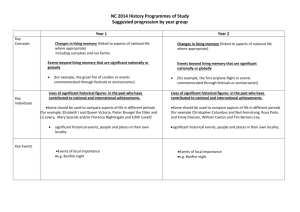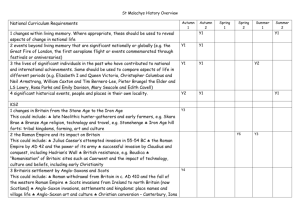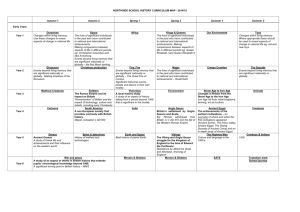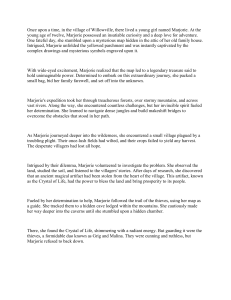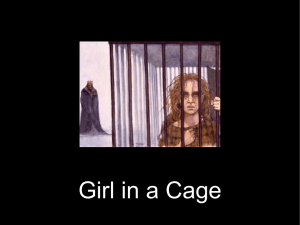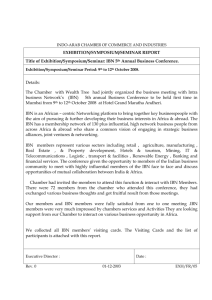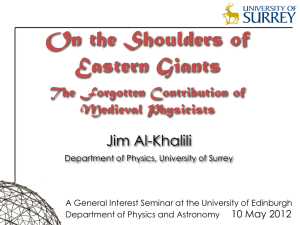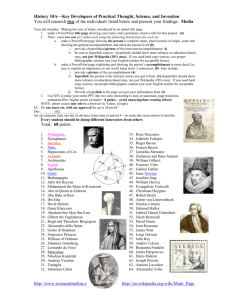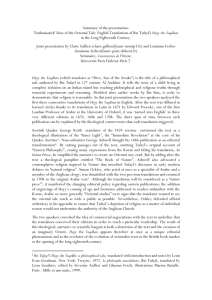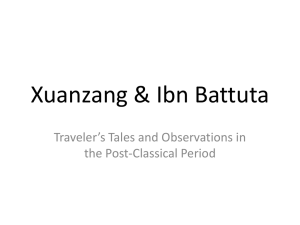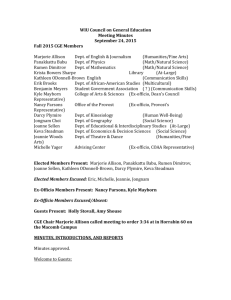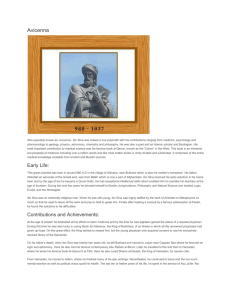kkkkkkk
advertisement
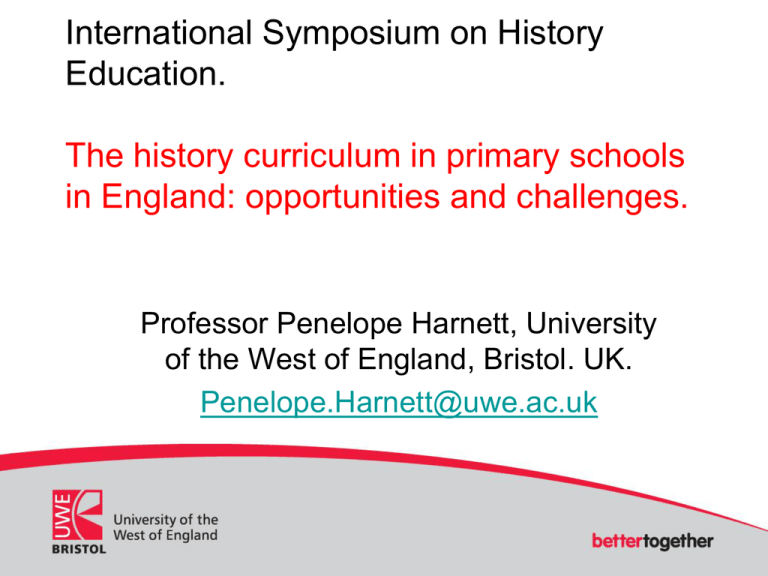
International Symposium on History Education. The history curriculum in primary schools in England: opportunities and challenges. Professor Penelope Harnett, University of the West of England, Bristol. UK. Penelope.Harnett@uwe.ac.uk Stages of schooling Key Stage 1 Year 1 5-6 years Year 2 6-7years Key Stage 2 Year 3 7-8 years Year 4 8-9 years Year 5 9-10 years Year 6 10-11 years Key Stage 3 Year 7 11-12 years Year 8 12-13 years Year 9 13-14 years Key Stage 4 Year 10 14-15 years Year 11 15-16 years History Programmes of Study include: • Specific historical knowledge for each Key Stage • Key historical concepts and skills such as: • • • • Asking and answering questions from a range of sources of information ( artefacts, photographs, paintings, maps, documents, buildings etc). Developing awareness of change and continuity; causes and consequences Developing a chronological framework of the past: Representations and interpretations of the past Key Stage 1 ( 5-7 years) I played in my play pen I was in my pushchair at the zoo Personal timelines • Developing important vocabulary • • • • Before/ after Now/then Past/present New/old Sharing memories • Sharing memories Learning about the past beyond living memory. Contents page... Time to get up Working at school Going home Time for bed Index and blurb Marjorie’s box Marjorie’s box • Do you think it is a boy or a girl? • Is it just a girl because it has pretty things? (Drawing conclusions from the information and justifying a conclusion) • Oh look, it has a diary – I wonder if it has a name inside? ( Raising a historical question to promote further historical enquiry) • What do you think she did? ( Another historical question to promote further enquiries) • Maybe she worked in a shop – isn’t that one of the jobs that people used to do? ( Speculative language – use of the word maybe. Draws on existing historical knowledge to support an hypothesis) Marjorie’s box • • • • Do you think that she was famous? Look at these gloves, do you think that she would mind if we tried them on? ( Awareness that working with a ‘real’ person’s objects and empathy with the owner of the objects) Oh – they’re really lovely – be careful though! ( Care taken in handling historical objects) Look here is an old book, it has a name in ... I can’t read this – the writing is really old but it begins with the letter M. Miss can you help me read this Name? Marjorie – the suitcase belongs to Marjorie but who was she? ( Draw conclusions about the name of the owner from historical sources – raises further historical questions) Great events; Remembrance Day ; the Great Fire of London; Olympic Games Significant individuals Guy Fawkes, Brunel • Mary Seacole, bru Significant individuals – Florence Nightingale • Opportunities for teaching about a greater range of significant people including: Scientists, artists, inventors, explorers and writers Ibn Battatu • Who was Ibn Battatu and when did he live? • What were the most important events in his life? • What was society like at the time when he lived? • What sources of information are useful to learning about Ibn Battatu? • How should we remember Ibn Battatu and why? The importance of play based activities in the early years • It is a very old toy. It is made from straw. It is not cuddly. It belonged to Miss Paddock’s dad. It used to have fur. It has holes. It has one eye. • (Label in classroom museum) Key Stage 2 history British History up to 1066 Changes in Britain from the Stone Age to the Iron Age The Roman Empire and its impact on Britain Britain’s settlement by the Anglo-Saxons and Scots The Viking and Anglo-Saxon struggle for the Kingdom of England to the time of Edward the Confessor A local history study A study of an aspect or theme in British history that extends pupils’ chronological knowledge beyond 1066 The achievements of the earliest civilisations an overview with an in-depth study Ancient Sumer The Indus Valley Ancient Egypt The Shang Dynasty of Ancient China Ancient Greece A study of Greek life and achievements and their influence on the western world A non-European society to contrast with British society – one of Early Islamic civilisation, including a study of Baghdad c. CE 900 Mayan civilisation c. CE 900 Benin ( West Africa) c. CE 900-1300 Local studies – central Bristol – now and then. Central Bristol in 1866 Key issues at Key Stage 2 • Developing a connected narrative of the past • Knowing about key events in British history Key Issues at Key Stage 2 • Role of history in a multi- cultural society – finding one’s own story in the narrative Key issues at Key Stage 2 • Emphasis on early histories before 1066 Key issues at Key Stage 2 • Primary teachers’ history subject knowledge – not history specialists. Key principles for learning history; the importance of talk • What are opportunities are there for a variety of talk in the classroom – disputational, exploratory and cumulative? • How are children organised so that they can share ideas and draw conclusions from their historical investigations? • Is the classroom context supportive for children to express their ideas and feel that their ideas are valued? • June 5th Personal timelines Playing at school
